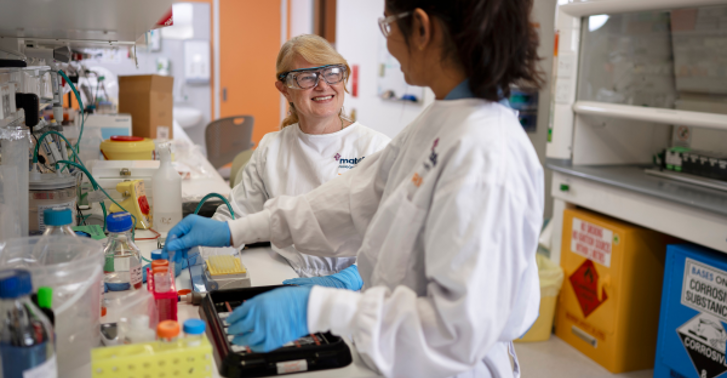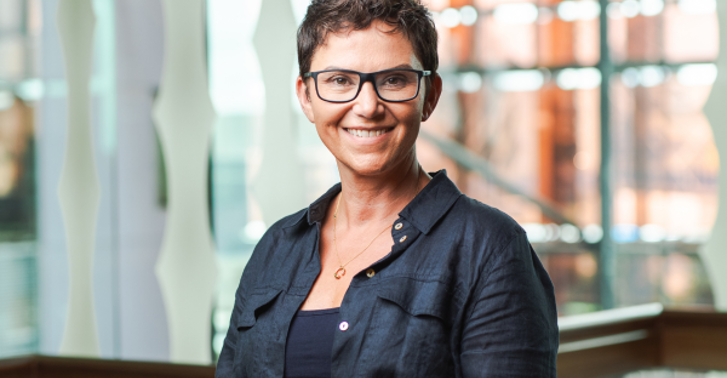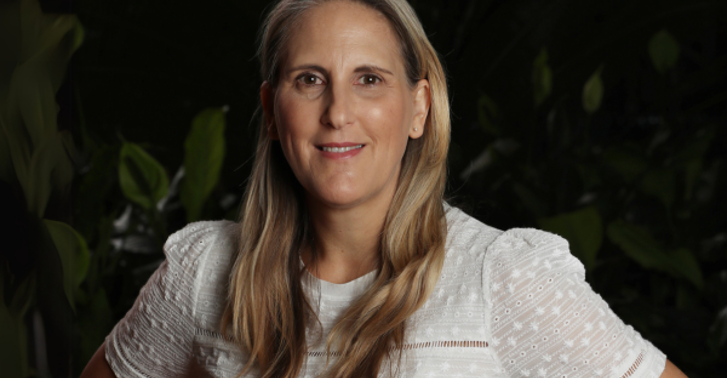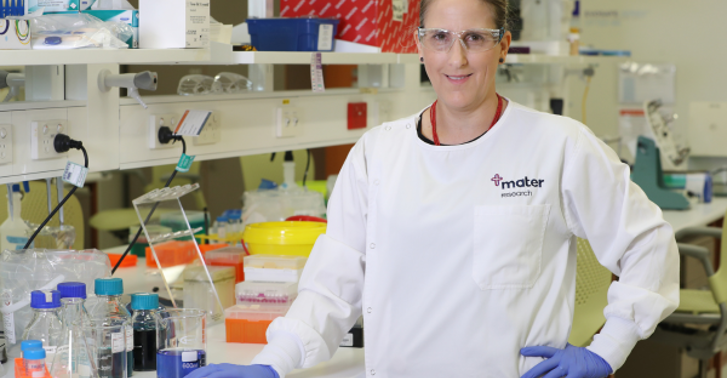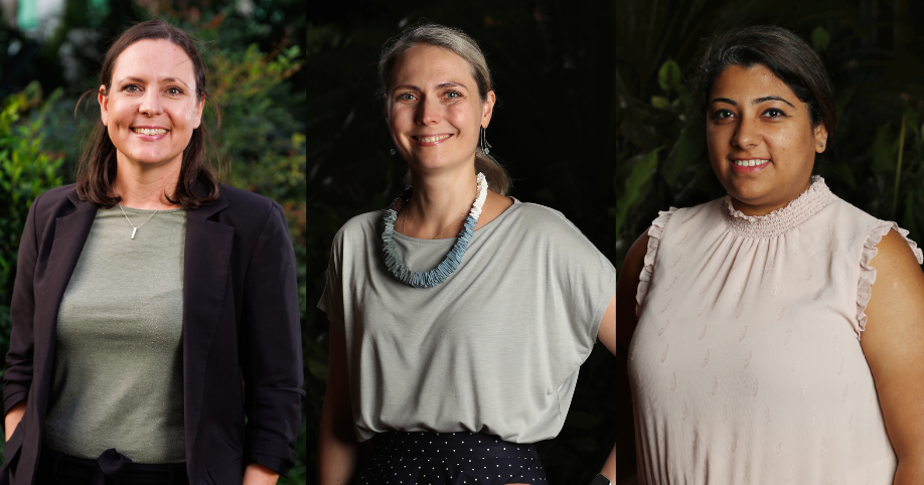
Three “outstanding” women awarded grant to bridge gender gap Equity, diversity and inclusion are workplace culture priorities at Mater Research. Thanks to the generous support of Mater Foundation, each year since 2017, Mater Research has awarded the Strategic Grant for Outstanding Women. This year, in recognition of the stellar quality of Mater Researchers, three outstanding women have been awarded this prestigious grant. Congratulations to this year's winners, Dr Léanie Kleynhans, Dr Irina Buckle and Dr Simranpreet Kaur.
Created to accelerate closing the “research and medical research gender gap” in the Science, Technology, Engineering, Math, and Medicine sectors, this $90,000 grant is provided as a flexible funding scheme to help women researchers overcome barriers specific to their career stage and circumstances.
Mater Research Director of Biomedical Research Professor Allison Pettit said Mater Research is proud to champion Drs Kleynhans, Buckle and Kaur as outstanding female researchers through this award.
“All three are emerging female leaders in their fields, with enormous potential to make high impact scientific discoveries that will progress healthcare options for Mater patients and the broader community,” Prof Pettit said.
“We thank Mater Foundation for generously enabling this career-advancing grant.”
Read on to learn more about how our three winners plan to use the grants to further their promising research careers.
________
- Dr Kleynhans, a Senior Research Officer in the Infection, Immunity and Metabolism Research Group, recently moved to Brisbane from South Africa along with her husband and young children. She said she now faces the unique challenge of establishing herself as a researcher in a new environment, while also finding a healthy work life balance.
With an established track record in receiving international funding, she hopes this grant will now enable her to apply for major competitive grants in Australia.
“This grant certainly boosts my career and provides support for my research for the next two years. Having recently moved here from South Africa, which has impacted my productivity, I am able to focus on generating necessary preliminary data that will competitively position me for applications through other funding schemes,” Dr Kleynhans said.
Having been mentored throughout her career by some “fantastic” women scientists, Dr Kleynhans hopes to pass her knowledge on and train and support other students and women in research, with the hope to help them shape their own career paths.
Dr Kleyhans will use the grant to investigate and establish a spatial lipidomics platform that will directly contribute to the understanding of lipids and lipid-derived molecules in different tissues and diseases. The grant funds will be used towards specialised reagents and specialized instrument usage fees, as well as conference attendance to disseminate the research findings and bolster her international profile.
________
- Dr Buckle, a Senior Research Officer in the Glycation and Diabetes Complications Research Group, plans to use the funds to employ a Research Assistant and pay for consumables to help her with experiments. Dr Buckle will test the effects of novel oral therapeutic drugs in next generation preclinical models which have a human immune system and develop autoimmune-like diabetes.
The grant will provide Dr Buckle with essential support for her research, closing the gap of reduced funding opportunities and allowing her to enhance her productivity and visibility within the scientific community.
“It will further facilitate my transition into an independent researcher and establish myself as a key female opinion leader,” Dr Buckle said.
Dr Buckle said all researchers must navigate a tricky funding landscape, which takes immense time and focus, but as a mother, she has the additional responsibility of caring for her family.
These extra responsibilities can affect recognition, visibility and participation in scientific meetings or networking events, subsequently leading to reduced competitiveness for funding opportunities.”
Despite this, Dr Buckle said that it’s also important to take the opportunity to recognise the help and support she receives from her family, colleagues and broader research community.
Dr Buckle said that she has been very fortunate to have been mentored by outstanding female researchers within Mater Research and beyond.
“I continue to draw from their experiences and expertise and foster collaborative relationships which have already resulted in successful outcomes. I actively engage in mentorship of women at different career stages and openly share my experiences and help navigate challenges we often face as women,” Dr Buckle said. “I am incredibly enthusiastic about the science we do every day; we really do have the best job!”
________
- Dr Kaur, a Research Officer in the Bones and Immunology Research Group plans to use the grant to employ a part-time Research Assistant, in order to increase her research outputs and boost her leadership development. In particular, this will allow her to generate preliminary data to increase competitiveness of application for external funding to continue to build her independent program of research. Dr Kaur is investigating synergistic mechanisms between bone marrow stem cells, macrophages and blood vessel cells that promote bone marrow health.
Dr Kaur is a single mother-of-one with sole custody, and therefore has particularly high caring responsibilities, that compounds the many barriers mothers face in navigating a research career.
"Being able to give enough time to my research can be a challenge - I cannot stay at work late to perform long experiments or write papers and grants, I can’t attend the networking opportunities and national and international conferences and I need to take carers leave whenever my child is sick,” Dr Kaur said.
“These barriers can be really limiting, however, I am so thankful for this grant. It will enable me to hire a part-time Research Assistant to increase my research outputs so I have more capacity to generate preliminary data for CIA grant applications and collaborative papers.”
“I’m also really looking forward to having the opportunity to showcase my research and establish both national and international connections.”
Dr Kaur’s current goal is to establish her own research group to find novel targets to treat age related blood diseases.
Dr Kaur’s advice to her fellow researchers is to have good mentors, follow a good strategic plan and work hard but also don’t forget to enjoy life.
“I am always there for anyone who needs guidance or emotional support. I give them example of my circumstance and motivate them by saying that if I can do it, then you can do it as well.”
